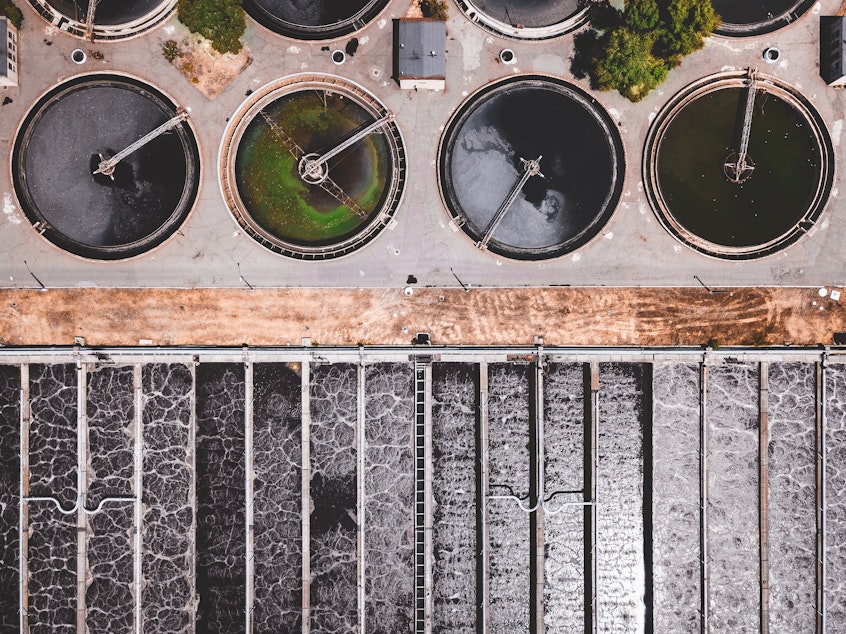What our poop tells us: Wastewater surveillance examines what most of us would prefer to flush and forget

You've probably taken part in one of the new frontiers of public health research: wastewater surveillance. All that's needed is a sample from down the drain: pee or poop.
Our feces and urine are helpful indicators in detecting all sorts of outbreaks and infections. And wastewater surveillance can give scientists a preview of new viruses and disease variants, patterns of drug usage, and much more, including potentially assessing the next pandemic.
The Washington State Department of Health (DOH), alongside the Centers for Disease Control and Prevention (CDC), is surveying wastewater samples in six counties as a way to monitor the spread of Covid-19.
It can be tough to get every person who suspects they are sick to take a Covid-19 PCR test. Not everyone has access to them and many people get Covid without having any symptoms.
The sewage surveillance is one way researchers can keep tabs on infection in a given area. This helps fill in some of our knowledge gaps about the state of the pandemic. Because well, everybody poops.
Sponsored
Muizz Akhtar, a Future Perfect fellow at Vox, said that this research is exciting because of its endless possibility.
"There's so much data stored in our poop, who knew?" Akhtar joked.
Akhtar recently wrote How sewage can warn us about the next pandemic for Vox.
They highlight that our poop has the possibility of telling us all sorts of things about ourselves. For example, whether we're hydrated or if we have a disease. Often the color and composition can tell you a lot.
Our poop has scientific value on its own. But paired with wastewater surveillance, it makes public health assessments much more accessible and comprehensive, as well as less invasive, Akhtar told Soundside.
Sponsored
"You can really get a good representative, less biased and anonymous look at a community," they said, "different ailments, different diseases, drug usage, without compromising someone's privacy."
Wastewater surveillance is not perfect. A lot of gaps still need to be filled to meet each nook and cranny of research goals. Testing wastewater for Covid detects the virus, but health officials say specificity would be much more helpful.
“Wastewater will tell you how much virus has been shed in a community. It doesn't tell you how many people have been infected," Ali Mokdad, an epidemiologist at the University of Washington, told KUOW's John Ryan.
Ryan told Soundside that Washington's Department of Health is still learning the ins and outs of wastewater surveillance.
Sponsored
So far, officials see it as "a new tool in the toolbox" and they're still learning how to make good use of it.
"What it's really best at is spotting really major spikes or major changes, or when a new variant, for example, shows up for the first time," Ryan said.
Not only that but the scale of data collected is limited. The number of places with testing capabilities is very small in comparison to the number of people who poop.
Washington state currently tests the wastewater of just a couple dozen counties.
Akhtar sees these limitations, but they are excited by the global possibilities of wastewater surveillance as the technology and techniques used to study sewage develop.
Sponsored
They look forward to public health officials detecting often neglected tropical diseases like Ebola, dengue fever and malaria, outbreaks that greatly impact the Global South. Global South broadly refers to the regions of Latin America, Asia, Africa, and Oceania, regions outside Europe or North America with low-income and/or marginalized communities.
"Wastewater services can be pretty easily rolled out if you have a big public sewer system, but not so much say if your communities depend on septic tanks," Akhtar said.
Akhtar said one of the biggest global issues is finding ways for more rural populations or places without public sewer systems to benefit from this research. Many of these regions depend on alternate toilet technology to dispose of waste, technology that doesn't work for wastewater surveillance, at least not right now.
"What I'm really excited about is seeing the innovations deployed during Covid being scaled up and used over the next decade and beyond," they said.
Listen to Soundside's full conversation by clicking the audio above.





